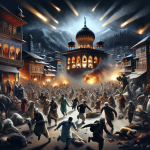Have India’s ‘Political Iftars’ Turned from Peacekeepers to Political Ploys?
Have India’s ‘Political Iftars’ Turned from Peacekeepers to Political Ploys?
Introduction
In India, the tradition of hosting Iftar parties during the holy month of Ramadan has long been a symbol of communal harmony and political diplomacy. However, recent trends suggest a shift in their purpose, raising questions about their role in contemporary politics.
The Traditional Role of Iftars
Iftar gatherings have historically served as:
- A platform for fostering interfaith dialogue and understanding.
- An opportunity for political leaders to demonstrate inclusivity and respect for cultural diversity.
- A means to strengthen community ties and promote peace.
Emerging Political Dynamics
Recent observations indicate a transformation in the nature of these events:
- Increased political participation, with parties using Iftars to showcase alliances and political strength.
- Criticism over the sincerity of these gatherings, with accusations of them being mere photo opportunities.
- Concerns about the commercialization and politicization overshadowing the spiritual essence of Ramadan.
Public Perception and Criticism
The changing dynamics have sparked varied reactions:
- Some view the political Iftars as a necessary evolution in a diverse democracy.
- Others criticize them as superficial gestures lacking genuine intent for communal harmony.
- Debates continue over whether these events truly benefit the communities they aim to represent.
Conclusion
While India’s political Iftars continue to be a fixture in the socio-political landscape, their role is increasingly scrutinized. As they evolve, the challenge remains to balance political interests with the original spirit of unity and peace that these gatherings were meant to embody.














